Scott Snyder's NOCTERRA is The Start of His New Comic Mission
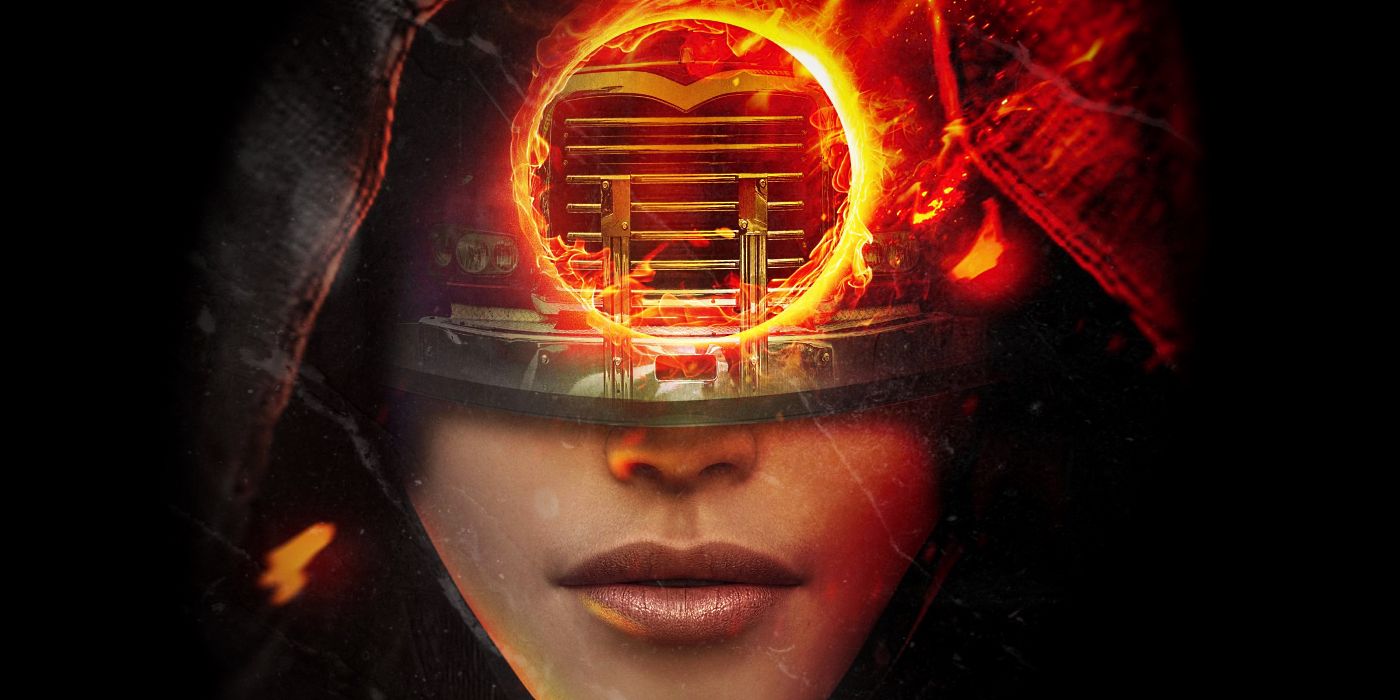
The arrival of Nocterra may be the start of a blockbuster comic book adventure, uniting masters of the comic book world to spin a tale of a world swallowed by darkness--and the brave souls who cling to what light remains. But for writer Scott Snyder, the series is only the beginning of what looks to be the busiest year in his comic career thus far. And one that shows exactly what he's after with his new label, Best Jackett Press.
For modern comic readers, Snyder is in rare company, earning a following with books like Wytches and American Vampire that would make him a household name even if he hadn't delivered an instantly-iconic Batman series in DC's New 52. A success that eventually earned him the reins of the entire DC Universe, leading Batman, Superman, and the rest of the Justice League into a reality-altering Death Metal celebration. But having been given the keys to DC's kingdom (as much as any writer ever can be), Snyder surprised his fans by announcing he would be handing them back, taking a year away to focus on creator-owned work. Projects like the already-optioned Undiscovered Country mean Snyder's prospects are as healthy as ever, but the next chapter of his career truly begins with Nocterra; the debut title from his newly created label, Best Jackett Press. And from what Snyder reveals to Screen Rant about the talent assembled under the new banner, and the unexpected stories already on the way, his 'year away' from the industry's biggest comics may be his most important yet.
The announcement of Nocterra was instantly the kind of 'launch' any creator could dream of, demonstrating the quality of work with which Snyder was looking to define Best Jackett. The premise? Our world darkened by an unending night, corrupting the creature (and yes, the people) who fail to keep to the light maintained by humanity's last remnant. The storytellers? Snyder personally penning the series, with all-star artist Tony S. Daniel, all-star colorist Tomeu Morey, all-star letterer Deron Bennett, and all-star editor Will Dennis. As a result, it surprised precisely no one when the Kickstarter to crowdfund Nocterra raced to five times its original goal.
But as the spread of the COVID-19 pandemic made the future of the comic industry, like all others, both dark and unknowable, Best Jackett's debut series serendipitously offered a light of its own. Now that Screen Rant was fortunate enough to speak with Snyder about the first issue's release from Image Comics, and learn about the creators who have already signed on for Best Jackett's debut slate--Greg Capullo, Rafael Albuquerque, Francis Manapul, Tula Lotay, Francesco Francavilla, Jock, and more--the true scope of Snyder's plan, and his investment in the future of indie comics, has never been clearer. Readers can find the full interview below.
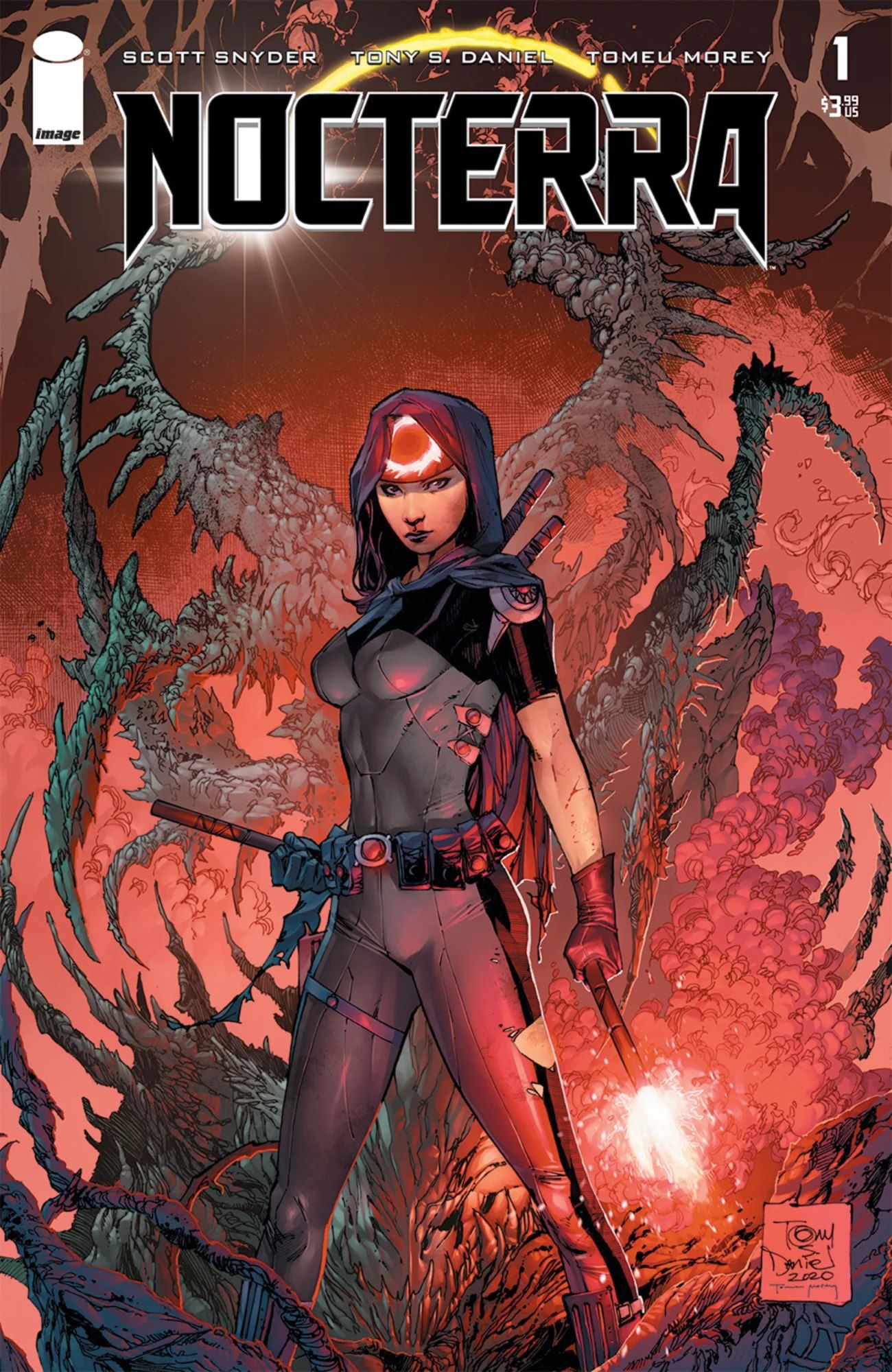
Screen Rant: I know many of your fans were both excited and disappointed at the news that you would be taking some time away from DC Comics. Now with Nocterra, that excitement is still very much alive. How does this work compare to your other recent projects?
Scott Snyder: Well for me, I think the strange thing was for so many years being in DC, I got to scratch my big, over-the-top, bombastic itch. I love epic storytelling; I love the widescreen, high stakes, high concept drama of superheroes. I like playing around with it and doing it more intimately at times, but it's got that urgency to it all the time that that never lets go. I loved leaning into that with Batman, and Justice League, and Metal and all of it.
Then my indie stuff in particular was a place I could go to flex very different creative muscles and play things a little bit more raw; experiment between After Death and Wytches and things like that. Now that I'm not at DC for a little bit, a book like Nocterra gives me a chance to bring all of those interests into one book. It has all of the fun and high-octane drive of a superhero book, but it is personal, and it does have the more intimate elements, and the slower character build of a book like Wytches. I wanted it to be the first one out of the gate and be able to, instead of defy expectations, lean into expectations, and say, "I can come to Image now or to indie comics in general through Best Jackett, and do anything that I was capable of doing in superheroes." But in a bigger and more individuated and singular way that's my own.
It started with this really simple concept - not to answer for too long, but maybe you can pull different things from it - that it wasn't just the fear of the dark. It's what the dark represents, in a lot of ways. For me, as a kid and as an adult, I've struggled with anxiety and depression at times. I think anxiety presents itself as a fear that all these worries that you have are not only going to come true, but are coming true. Your body kind of reacts in a way that feels viscerally and acutely responsive to that. So it feels like, "Oh my god, these fears that can't be real are real, and they're happening right now."
And in the dark, all of those fears seem much more material, and much more possible. If anxiety is sort of a fear of the unknown, and what fills that space is all these doomsday scenarios in your head, then the dark is a perfect metaphor for that, and also a literal place for them to live. There's a lot in there in the book, both on an intimate level and also on a macro level, when it comes to the things that I think about for my kids. The book is essentially about a darkness that separates all of us from one another, and makes us unrecognizable to each other. The point of the book is the ways in which collectivism and connectivity are the only ways to fight this thing.
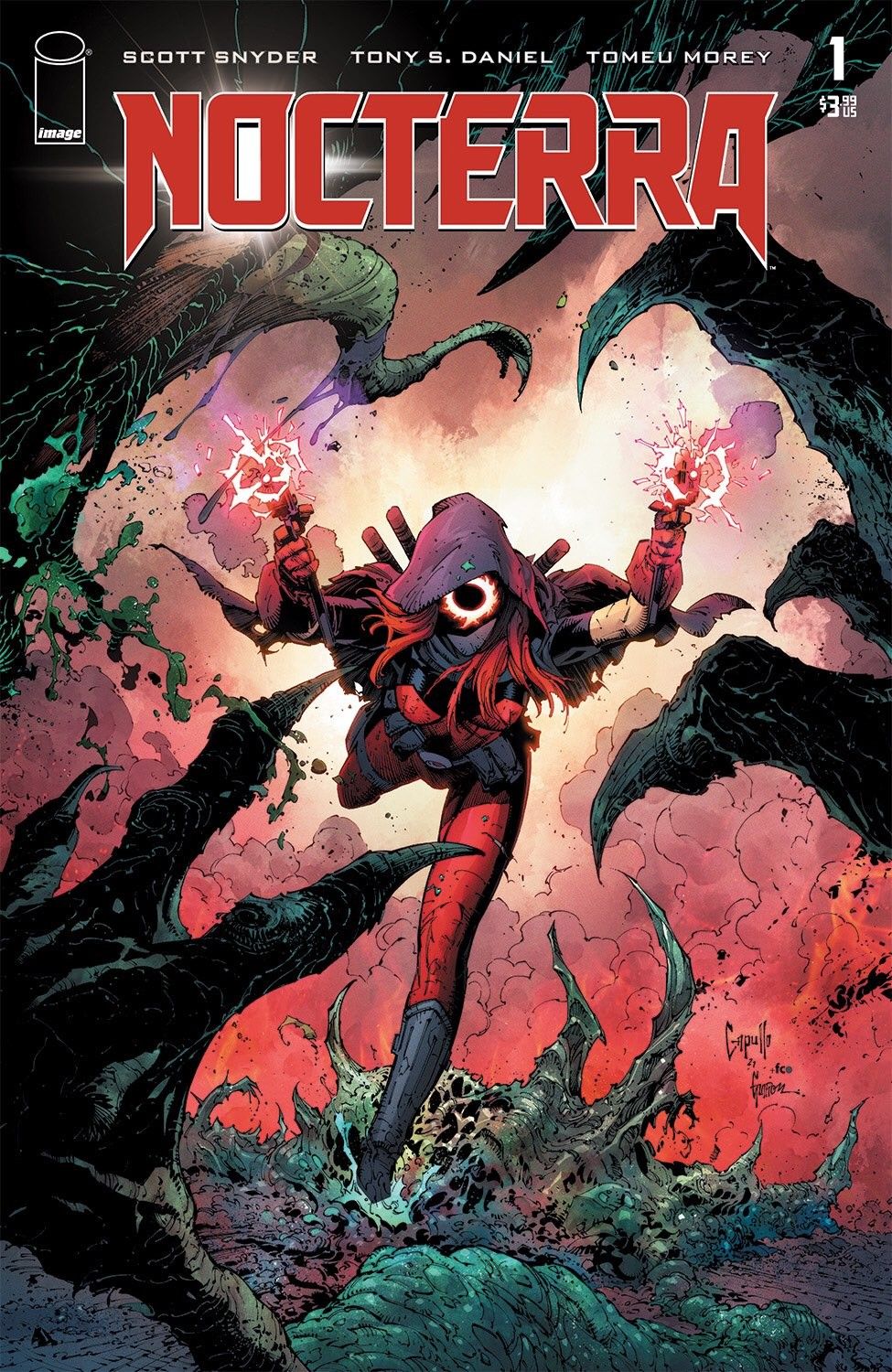
It's a really personal project on a lot of levels for me, do it was really fun building out the world and making it something that had a really robust mythos, and different locations and set pieces, and character histories and all of that. We have so much planned and so much backstory and all; I'm not even sure how we're going to be able to get to all of it for the first couple of arcs. I'm planning on doing a second arc that flashes back and shows you the backstory on the villain, Blacktop Bill. There's just a lot of material, and it's been a tremendous amount of fun to build out.
SR: I assume it comes from you being a teacher, that you often talk about pushing yourself and striving to becoming a better writer. You're kind of waging war on two different fronts: major publisher work that is pushing one envelope of being audacious, and then the creator-owned work that you describe as more intimate. Was Nocterra an intentional challenge that you wanted to take on? Death Metal felt so big, but also so personal in your message, picking this up made a lot more sense than I expected.
Scott Snyder: Oh yeah, absolutely. My love of summer blockbuster storytelling is deep, and genuine, and infinite. I love everything from superhero movies and Indiana Jones to Terminator, Alien, John Wick. I love them unabashedly, and my kids do as well - the versions that are rated within their range.
I've never had any shame about loving and leaning into that kind of storytelling. The big, bombastic, Spielbergian, heart on the sleeve sorts of narratives are things that I've just always embraced. I think one of the strange misconceptions sometimes is that indie comics are a place for you to go to do things that rebuke that, or to move away from that kind of storytelling, because superheroes is where where you do that. And yet we have series that are acclaimed and long-running pillars of the comic industry, from The Walking Dead to Y: The Last Man, and Preacher, Hellboy. As much as they're revered now, those are bombastic, high-concept pitches, as well.
The point I'm trying to make is that: the indie world, right now in particular, is a place where a lot of people are going to experiment with not just their most experimental and challenging ideas, but also the stuff that will bring as many people into the tent as possible. I think there have been a number of reasons for that. The biggest is just that I feel there's an influx of readers coming to indie comics, because they found superheroes and comics through the movies and through TV. Now with the popularity of things like The Boys and Watchmen, that deconstruct superheroes and take them apart, they're emblematic of the way in which viewers are looking for things that they can they can claim as their own. They've moved beyond big, over-the-top, banner, superhero event stuff. I think that's just a cultural moment.
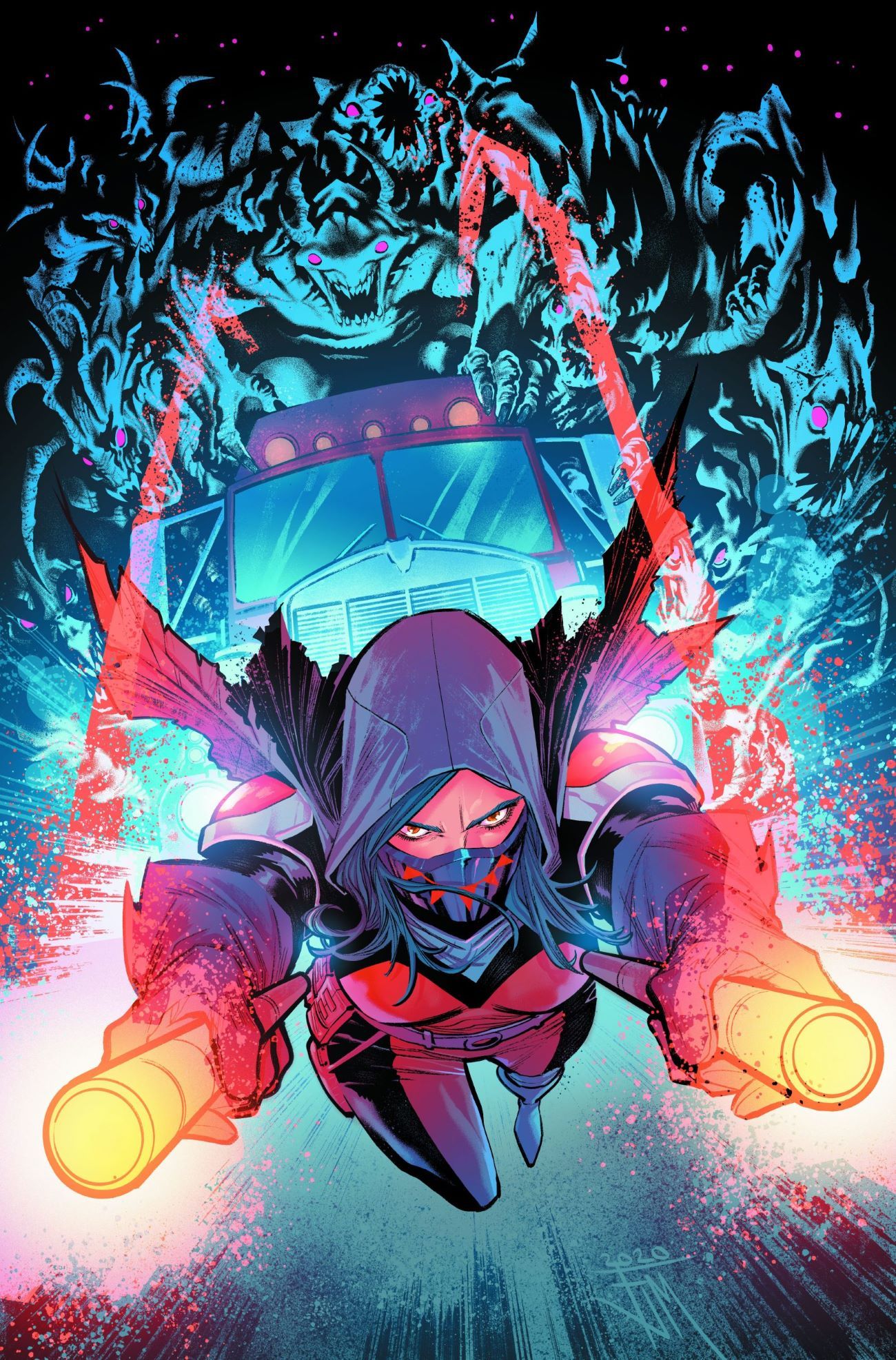
It's driving a lot of people to indie stuff to look for new heroes; to look for books that they can find as their own. My kids find it through things like anime, and manga, or Fortnite, and all of that. I think we have a really big chance right now to expand the tent of comic book readership, both through embracing fans through new avenues, whether it be digital or collaborations, and through indie comics. Remembering that baked into the DNA of creator-owned [work like] Spawn and Savage Dragon - all of these things that I think really reveled in the comic book lunacy of high concept storytelling, and it's stuff that we love. I think you're gonna see a lot of it in the coming years.
I think one other big factor, if we're just talking bluntly, is what you're already seeing. You see Geoff Johns coming over with Gary Frank to do Geiger, which he said himself is an homage to '90s Image Comics. Radiant Black by Kyle Higgins is straight up Power Rangers superhero storytelling. You're seeing it move over. Fire Power by Robert Kirkman, which is a great book that's embracing fun, big, kung fu stuff. All of which are quality books, I don't think anything suffers in quality. It's more just a matter of genre and texture.
Then you also see that people are able to make a living doing indie comics in strange ways that they weren't years ago. Not just through the growth of Image, when it had its boom in the mid-2010s, but because there's such competition for intellectual property because of the streaming wars, and all of that. All these new platforms are desperate for content, doing an indie comic has a much bigger chance, all of a sudden, of being optioned. Does that mean you're going to make a million dollars or anything? No, not at all. But what it means is, if you're able to get things optioned, it's a stream of revenue that comes in and allows you some breathing room to make more comics.
It might not be a lot of money at all, and it might just be something that's flash in the pan. It's not all about some jackpot you're trying to win by hoping that it becomes a TV show or film. But it's a way of sustaining yourself economically making indie comics. It's way more viable now than it was 10 years ago, because there's such a demand for content. So, I think you're gonna see a lot of growth in the indie comic world in particular. And a comic like Nocterra, for me, is meant to be a celebration of all of that. It's the stuff I love to write, in the way I love to write, in the zone that gives me the most freedom to make it as personal as possible on top of making it the most fun possible.
SR: Indie books have tended to be a place for writers to get out of the bonds of a massive publisher, where you can only meet the expectations for the existing fans. But with indie books, you have to prove to readers why they should be interested in the story you want to tell. So what happens when the Kickstarter for Nocterra makes five times the goal, and people are massively anticipating it as much as any major publisher book?
Scott Snyder: It's invigorating. The thing with the Kickstarter - not to get too in the weeds - really was that we decided to do that in a moment when the industry was really hurting. Image was shut down, a bunch of companies were stopping production, and Tony and I had already begun work on the book. For us, it became a matter of doing something with integrity that allows us to make sure we have enough money in the bank to make this book regardless of whether or not COVID hits again, without a vaccine, and without any hope of any kind of re-opening. And how do we also give fans something that isn't a rip-off? That allows some kind of connectivity in a time when we're all feeling separated from one another.
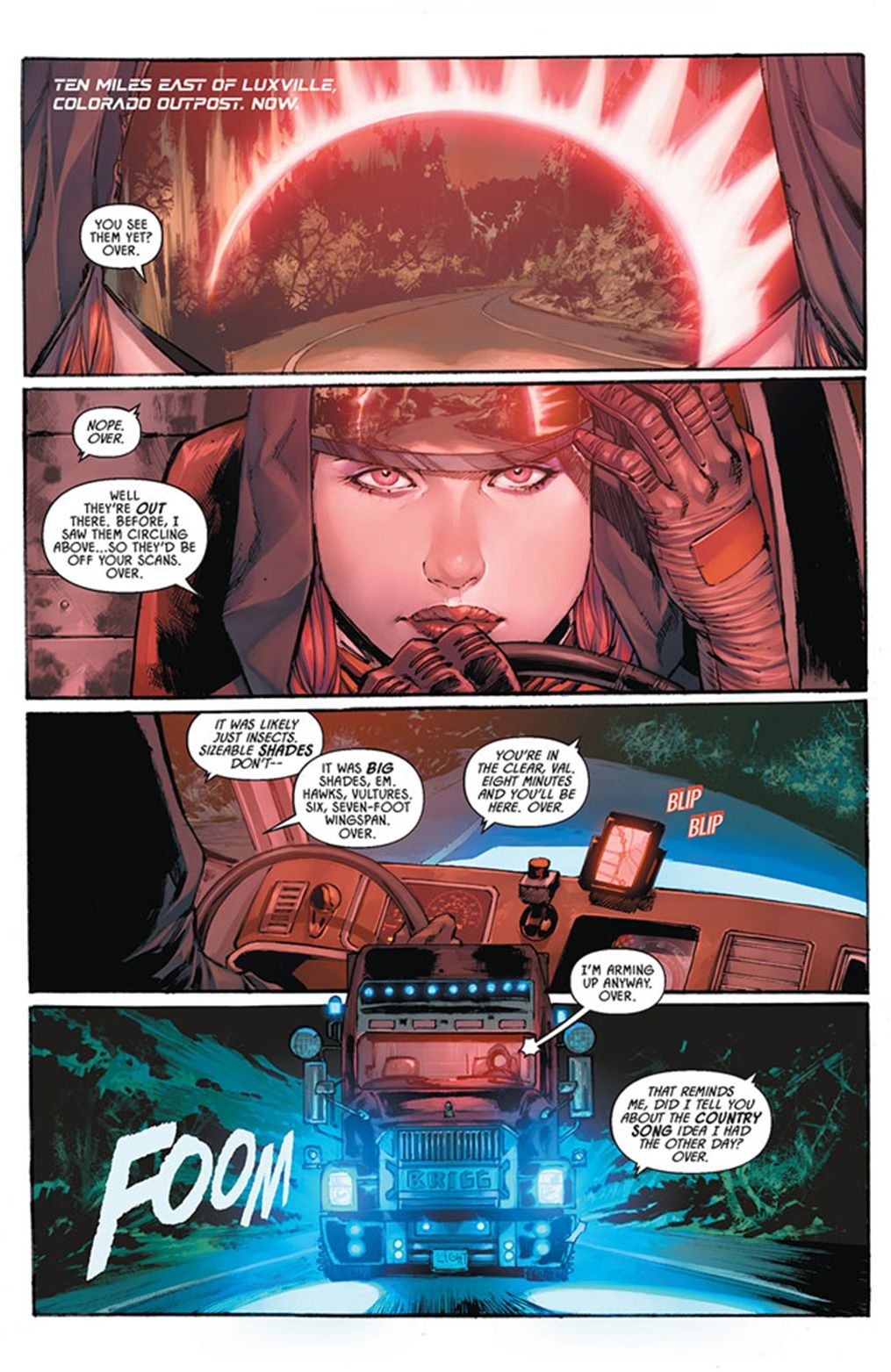
The Kickstarter was a lot of work, but it was a lot of fun putting something together that for the first time really, had my script that I looked over and made sure it was ready for publication. Tony's black-and-white art, essays, all that kind of stuff that would say, "Here's a window into our process." So that when you get the final book, which is in color, and has very different dialogue and different narration, you can see the process from beginning to end of how we got this final product onto the shelves. It allows you a window into both the way that we made comics, and also tips and suggestions about how to make your own comics. So it felt really good, and I was stunned, and really humbled by the success of it.
What it's allowed me to do, and this was another big part of wanting Nocterra first, is to really open up possibilities with Best Jackett. For me, Best Jackett now is the label that I'm starting for myself, where I'm able to publish my independent stuff through different publishers, and I'm not locked into one place. The extra money that I made from the Kickstarter went straight to the next book that is going to Image. It's called Chain with Ariela Kristantina, about a remote outpost in the Arctic. It's more like a lockbox mystery up there during the end of the world, so it's a lot of fun, but a totally different kind of book.
Then the other the other thing we're going to do is we're going to have an expo in late spring, where I'm going to be able to announce all the books. We have about eight other books that are in production, that I've been squirreling away for years in different ways with different artists. Francis Manapul has one of them; he's done with issue one. Francesco Francavilla is doing one; he's done with issue one. Tula Lotay is doing one. There's one with Greg [Capullo], he's doing one. There's one with Jock. So it's a really big reveal that we're planning for May-June. Just to say, "Here's everything coming. Here's the way it's going to come out. These might come out digital first, this one might come out with Dark Horse..." That's all hypothetical, they're all things that we're considering. Some are locked into places, some are not. But the idea is to be able to say, "This is everything locked in and this is how they're coming out." Between now and the end of 2022, this is what I'm living in.
A lot of them are a really unexpected format, given what you've seen from me in the past. The one with Francis is sci-fi noir, the one with Jock is almost a young adult prose horror story. The one with Tula Lotay is pure historical fiction, about a Barnstormer who's traveling across the country in the early 1900s and runs into trouble. No supernatural elements, no horror. The point with Nocterra is to say I'm embracing all the things I love to do and that you expect from for me, and trying to do it in a way that elevates them in the best quality that we can put together and say let's just have fun. And then, with the whole announcement of all these books, to show different prismatic angles on the kind of storytelling I've wanted to try for a long time that is not as comfortable for me.
I want to I want to stretch and be the most exciting writer to myself in 2021. Nocterra is more of a, "Let's like go out there swinging," and then I'll show you all the stuff behind the curtain that we're going to do. That's going to surprise people for its, I think, elasticity.
SR: I want to go all the way back to 2015 for a moment, when you were doing press for Wytches. And in an interview [with Horror DNA] you said: "There are at least two or three more monsters I want to play with. I feel like no one's ever done anything with ghouls. They're sort of like the redheaded stepchildren to zombies."
Scott Snyder: Yep. [Laughs]
SR: The line from that quote to Nocterra may not be a straight one, but my brain definitely sees that line, that even in a world of monsters and nightmares like Nocterra, it's the humans who have succumbed that bring the most terror. The weight that adds to the story is so familiar in your writing: the presence that is scary because it's there... and you're not seeing it.
Scott Snyder: Yeah. And you don't see the human shades until issue five of six. So just wait until you see. They come in, and you'll see they're a whole new level of horror.
But I'll do you one better. I'm not technically supposed to say this, but I will say it, so no worries. The book I'm doing with Francesco Francavilla is called Night of the Ghoul, and it literally is an exploration of the ghoul as a classic monster. The book is about a guy who works at a place that restores old film, and he comes across the remnants of a film that was said to be destroyed in a fire on a studio lot. But it's supposed to be this legendary amazing horror movie, that was by this director who just did this one film called Night of the Ghoul, and then vanished.
So he tracks down the director who's still alive, at about 100 years old and in a hospice, and he brings him the pieces of this film. The book is intercut between the black-and-white film, which Francesco draws beautifully, and the modern day suspense of what happens in this hospice as he goes there to confront him. And the guy says, "The ghoul is real. That's the secret of the movie... and it's here in this building."
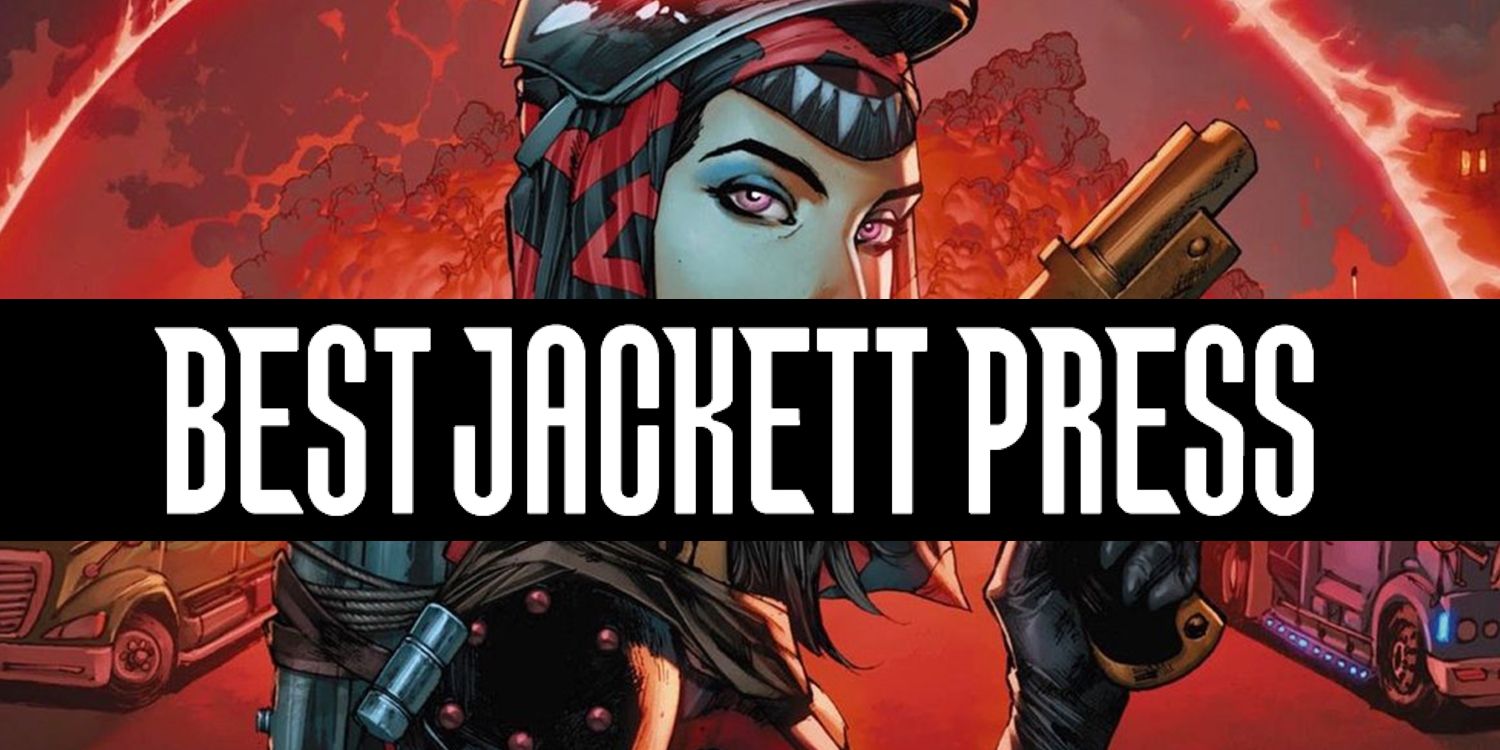
All of these ideas are things that have been in my head a long time. The book with Tula Lotay, for example, is an idea that I played with when I was doing short stories but never got to finish. There's a really nascent version of the story in my collection of fiction from 2006, and it's something I've always wanted to return to and expand on. These are all my little passion projects, and finding the right creator for each one was key. What Best Jackett really is, is both working with people who I've made my whole career with. So you'll see everybody, Rafael Albuquerque is part of it too; it's really almost everyone that I've done significant work with. But then there's a lot of new voices as well. I'm working with Jamal Igle for the first time; working with Ariela Kristantina. There's a lot of, "Let's make things that we love that we've been talking about for a long time. And let's also try some new things." I've never been happier or busier.
Also, I love what DC is doing right now. And Marie Javins, who's in charge, is my dear friend and was my editor on both Metal events and in between on Justice League. along with Tate Taylor, who is great and over at Vault now. I couldn't say enough good things about the state of DC, and I'm excited to go back at the end of the year. I'm doing one big project for them at the end of 2021, but I have this year to kind of play in my treehouse until then.
SR: That collaboration with others working on both sides of the industry extends to Tony S. Daniel as well. You have spoken about working with artists by writing to their strengths or sensibilities. Everyone knows his work. Even if you only read Batman, you know he's one of the best, but this is Tony S. Daniel unleashed.
Scott Snyder: Oh yeah. And that's what we had said. I pitched him the idea almost three years ago when we were at San Diego Comic-Con. And I said, "Listen, we still have some stuff ahead of us, but when we're done, let's do this book." And he was like, "Let's do it. I love it." The fun of it was to say, "I can change my style to fit your style. I can change my style to push your style to a new place. You can push me. How do you want to do it?"
He said that he felt like the grind of superhero stuff, as much as he loved it, had taken a toll on his ability to do his best work, and really learn new techniques, with inking and all this stuff he wanted to do between traditional and digital. And what he wanted most of all was just room to do that. So I said I have a lot of tricks in my bag, and I have a lot of ways to push boundaries with what people expect from them, and from me. Some of the books are designed to be exactly that. What Jock and I are doing is very different from anything we've done before. What Rafael and I are doing is very different from anything we've done.
But with Tony, we'd never gotten to work together in earnest. We'd done a little bit on Batman Eternal, and we've been friends since 2010 when we made up all this Joker stuff together, with his face cut off. He was on Detective and I was on Batman, and he was a really good mentor and friend when I was terrified and a total newbie in Gotham. The idea here was, instead of trying to make him unfamiliar or new to people, and instead of me trying to reframe my own writing sensibilities - why don't we just enjoy them, and celebrate them, and lean into that big, Spielbergian summer blockbuster stuff that his art does so well? Through its muscularity, through its big, emotional canvas, all of it. The world building he does so well, especially he's given so much room. And I'll lean into my sensibilities. I'm not going to trick you; I'm not going to do a flash forward five years from now and then backup, I love those things; they're not bad tricks.
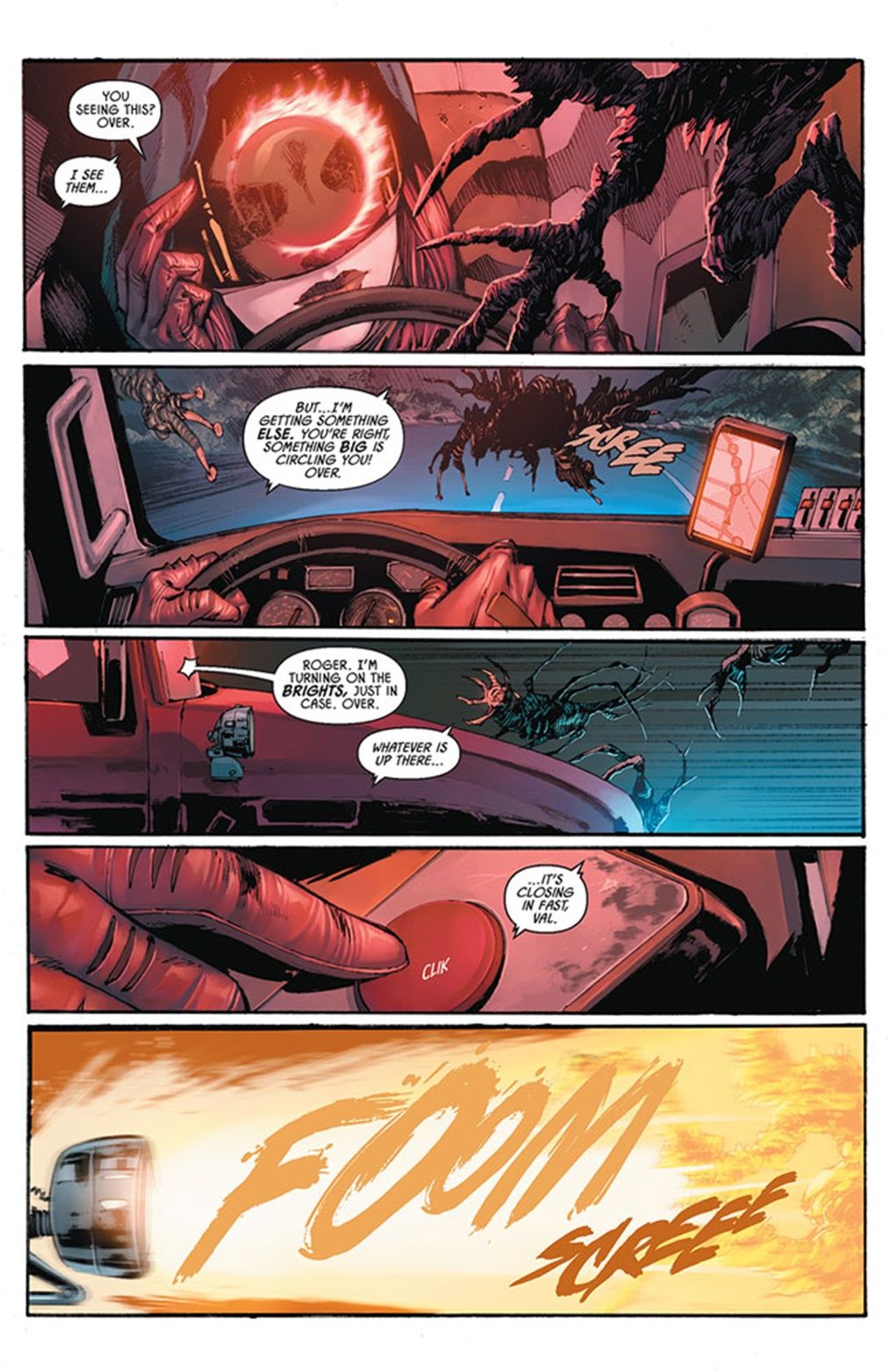
But I was like, "Let me see if I can write something that's really conventionally structured and plotted, that goes from point A to point B to point C, following all the storytelling structures that we all learn. the inciting incident, this and that." If I can just do it well enough, and do it personally enough, and let Tony shine, it elevates that book from being something that's just familiar in its structure to being something that you love. Because it embraces that kind of comfort food feel of a classic big summer blockbuster story. But my hope is that, because we both love doing it and we've given each other enough space and time to make it something strong, that people get into it, and think it's up there with our best stuff. You'll see me try really different storytelling devices and modes in other books. But this one, I was like, "We're gonna drive right up the middle man, and we're gonna make them love it." Let's just do it, let's just go for the ride.
SR: Because it isn't said enough: Is there a better colorist working today than Tomeu Morey?
Scott Snyder: Oh, he's so good. I can't say enough great things about the whole team. Tony, again, is just bringing I think is his best work of his career to this. And he's a dream to work with. A lot of the time you work with a superstar artist, and you guys have circled each other - you have your own ego and all that - and you clash. But the thing that I really look for in a partner is that they're willing to put story above ego, and I try really hard to do the same. If they have a better suggestion, I'm always up for it. I always say, "Take the script as a blueprint and do anything you want that you think is better." And Tony, being a writer himself, has been such a great partner. He's come up with so many things: for Val, her background, the story itself, and the world. It's been a joy.
The challenge that Tomeu faced, just to be clear, think about it. Someone comes to you and is like, "You're a colorist, but this book all takes place at night. But we want it to feel really, really dazzling." His ability to do that; to take a world that's insanely dark, and make it really rich with color and light and texture is really unparalleled. He's fantastic, and I love him. He's just a great partner too.
Let me also shout out the letterer Deron Bennett, who worked with me on a bunch of Batman stuff, and has become a friend. He is a real master of the art of lettering, just the flow of information, the flow of story, the fonts, all of it. We had to develop a special kind of balloon and font for the human shades. He's a blast to work with. And Will Dennis, who is the editor, and the person who first approved and greenlit American Vampire at Vertigo. He's responsible for all those great Vertigo books back in the day. He deserves to be talked about, because he's made a big historical mark on comics, and he's a great editor. It's a full circle thing, where it's a lot of people who really like working together; who know each other and function is a real team on this one. It's a blast, and I can't say enough good things about everybody involved.
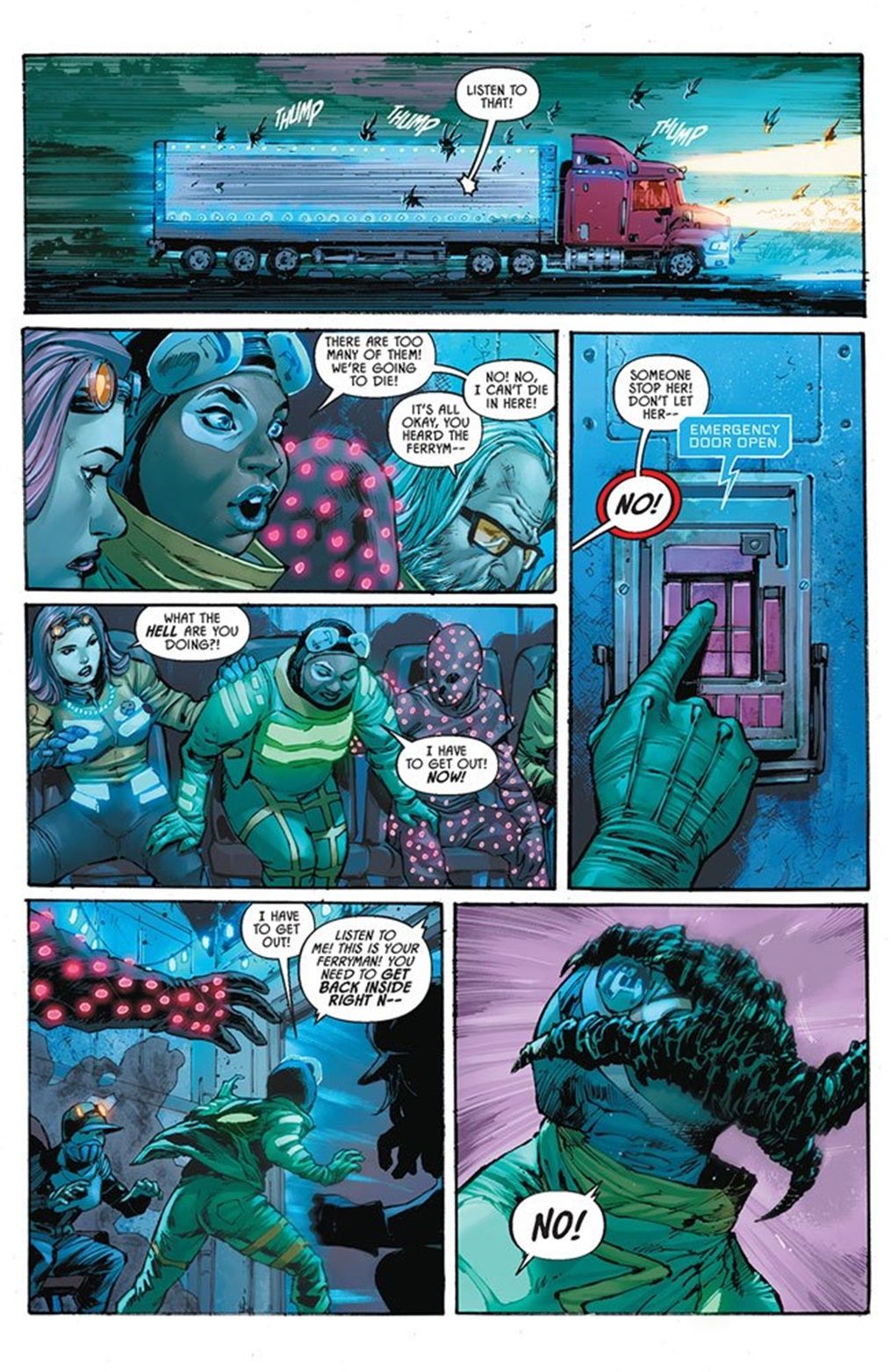
SR: You make no secret of the fact that you tell stories where monsters or antagonists are an internal fear or an anxiety made manifest, and the fear of the dark is there as inspiration for Nocterra. But the first issue is entirely built around Val's response to the world being swallowed by darkness. That the world became what she always knew it really was. That the light was the lie.
Scott Snyder: Exactly. It's also of the moment to me. I think we're really at a tremendous inflection point, both nationally and globally. I think there are a lot of questions about: is human nature what we thought it was? And even if our nature is darker than we'd like to admit, are we able to really come together to overcome these entrenched and systemic problems? Or is it better to be more solipsistic and just go, "This is my life and my thing to protect"?
I think that conflict is the big running theme of this moment, all around. You see it play out in so many different ways, between the mundane - like the way people consume entertainment - to the much larger, more urgent issues of the world. The book does have a really big connection to what's going on. I honestly don't believe in the term "escapist." I feel like, if you love what you're working on, then you're putting something personal into it. And even if it's something that is deliberately designed to take people out of the world in that deliberate move, it is engaging the world by its own inversion. Nothing exists in a vacuum, and nothing pulls us out of reality, it's all in conversation with the moment that you're making it in.
On Batman, like when I did Zero Year in particular, or Metal, which was the really big experiment with this, the challenge was to take something very personal - whether it's about the state of comics, or it's prescriptive about what you think should happen like in Metal, or whether it's something that's really personal about how you want Batman to function for your children in a world where he's going up against fears that didn't exist when you were a kid like Zero Year - sometimes the best way to do that for a particular story is to translate those issues into the lexicon of comic book insanity.
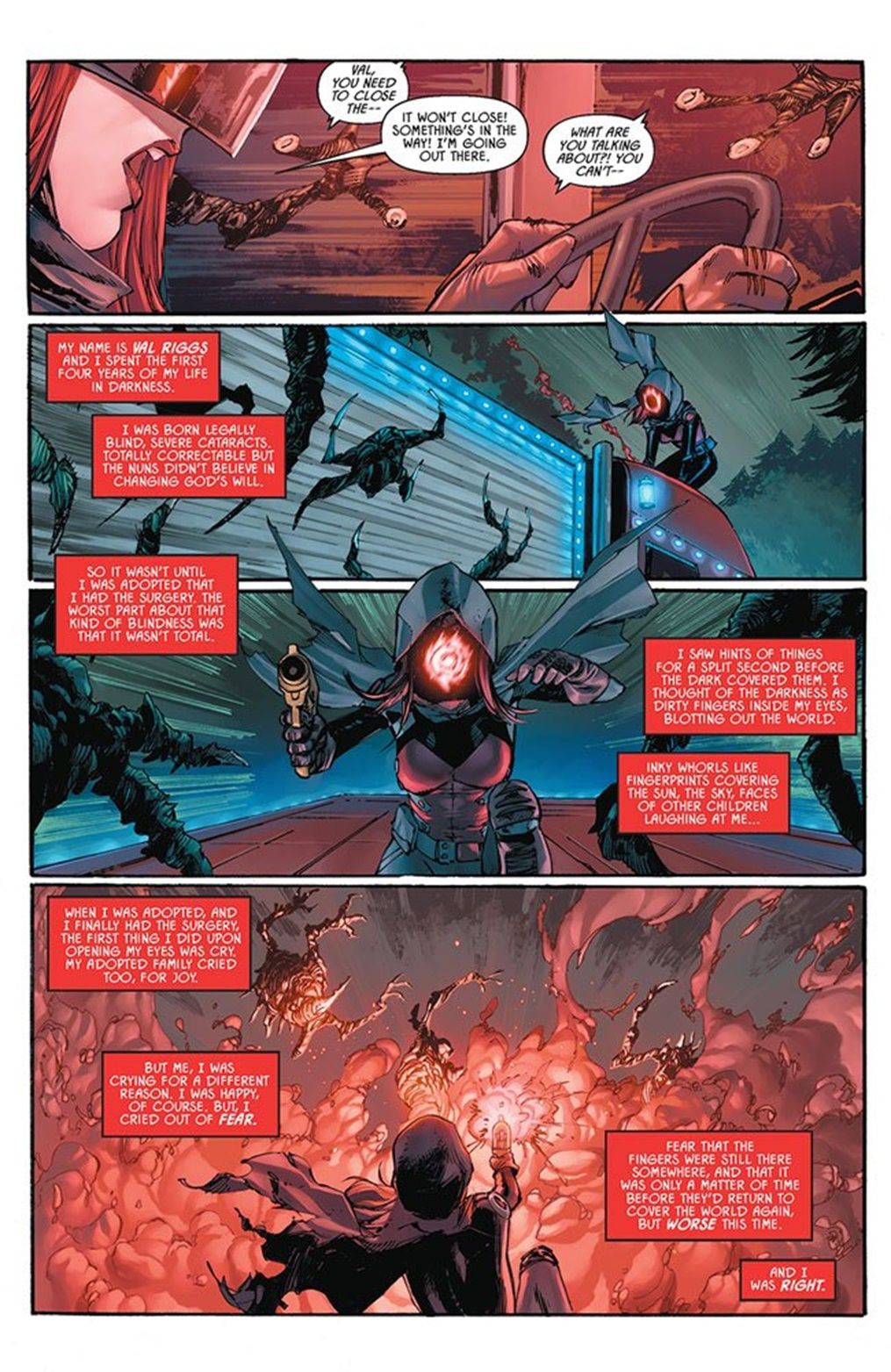
Instead of having somebody waving a gun around the school, you have the Red Hood Gang going around with Riddler bots, and saying, "There's no reason for us to attack this place, but we believe in a private ideology that you'll never be able to access, and therefore, we believe we have the right to do XYZ." Nocterra really follows those rules. It's a book that I don't think anyone's gonna read and say, "Man, they're thinking about this moment," but we are. Its connection to this moment is deliberate. And again, I don't think there's an issue of anything that I've written that people could accuse me of not trying to invest in personally and have some element of my own hopes and fears. For better or worse. Whether or not it makes my writing better or worse, I can't speak to, but it's the only way I know how to do it. Nocterra is very much a story that is a lot of heart surgery.
The things people cite as having escapist tones, like Star Wars, are so ridiculously parallel, or in conversation with the zeitgeist of the moment they were made. It's ridiculous. Or it's an industry thing you're talking about. Nocterra is pretty bluntly that, it's sublimated a bit in terms of its immediacy, but it's literally about a darkness that separates us, and we don't know what's in it, and it changes us into monsters so we don't recognize each other anymore. It's pretty on the nose about certain things today. But it's also like, "Look out for that giant bug bear monster hawk!" and you're like, "Oh yeah. Was it? I forgot."
--
Nocterra #1 is set to release on March 3rd, 2021 -- so call your local comic book store to reserve a copy today.
from ScreenRant - Feed
